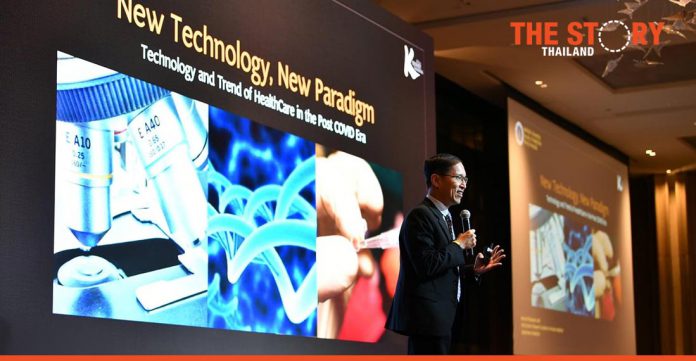Surge in personal investment in medical technologies
The race to provide vaccines for the SARS-CoV-2 coronavirus – the virus that has caused the COVID-19 pandemic – has brought a surge of popularity for personal investments in health and medical innovation.
-A mission to tell the oldest stories on the newest media
-Imagination and innovation in food delivery
It is a trend that has been highlighted by KBank Private Banking (KPB), which is promoting investment in its K-Global Healthcare Equity Fund (K-GHEALTH). The fund focuses on long-term investments to capitalize on ‘the new horizon of medical innovation’. It describes this as precision medicine that works ideally through customized treatment, practices and medical decisions that are made according to the needs of individual patients, after diagnosis that is led by the individual’s genetic structure.
KASIKORNBANK (Kbank)’s Managing Director and Financial Advisory Head for KBank Private Banking Group, Siriporn Suwannagarn, expresses the hope that the successful development and deployment of COVID-19 vaccines will ‘turn the pandemic around’, allowing a return to normal life that will bring Thailand’s economy ‘back from the brink’. This has led to the emergence of innovative technologies and, as a result, there are abundant opportunities for investment in global healthcare.
The point was confirmed by the Professor of Medicine and Head of the Medical Genetics Division at Mahidol University’s Faculty of Medicine at Siriraj Hospital, Dr. Manop Pithukpakorn, who said the medical-business segment had one of the largest research and development budgets of all industries.
He said the COVID-19 pandemic had proven to be an important accelerator for pharmaceutical companies to apply innovative technologies in making vaccines as quickly as possible.
There is a new understanding that human genetic codes are important factors of disease and illness, Manop said. Moreover, technological advancements mean that genetic decoding can now be done far more rapidly and at a considerably lower cost.
Precision medicine identifies the sickness and physical abnormalities of individual patients, and how these differ from others. Formerly, seriously ill patients with the same basic issues were all treated by the same methods, and the results differed on a case-by-case basis. Treatments have now become more efficient, with precision medicine using genetic codes to learn where each patient’s problems are coming from and which treatments should be applied for the best results.
Precision medicine can also detect existing risks, to prevent illnesses before they become serious.
Manop said global anticipation and concerns over COVID-19 had enlisted all of the innovations and knowledge around the world in a joint effort to achieve the most rapid vaccine development in history – only eight months, and the first vaccines are already being administered. This was a ‘first’ in the medical field.
There are now 140 vaccines under development, and those developed by two companies, Moderna and Pfizer, have been approved, with four or five others close behind.
This year, the combined production capacity of these companies will reach 8 billion doses, to cover more than half of the world’s population. With proper allocation of vaccines, the COVID-19 pandemic will hopefully be halted, and normalcy will return, Manop said.
The Executive Director and Investment Specialist for J.P. Morgan Asset Management International Equity Group, Nicholas Wilcox, said it was exciting that various groups had joined forces in an effort to end the pandemic. This, along with large amounts of investment in public health, staunch efforts to combat the pandemic, successful vaccine development, supply-chain restructuring, and the use of technologies in daily life – including social distancing, telemedicine, and real-time remote communication between patients and medical personnel – are some examples of megatrends.
At the same time there is clear evidence of long-term drivers in global healthcare, he said. These include disruptions caused by the transition towards aging societies and expansion of medical services into developing countries. Although healthcare services have been popular among personal investors for some time, it cannot be denied that the COVID-19 pandemic has quickly prompted people to become more health conscious, causing health-related businesses to thrive.
“Looking deeply into the healthcare sector, we are of the view that many sub-categories in this sector, including large market-cap pharmaceutical companies and small to medium market-cap biotech companies, will be major beneficiaries of mergers or acquisitions”, Wilcox said. “They presently remain strong, while prices are not too high. Finally, we believe that the healthcare sector exhibits a promising outlook and will steadily launch innovations going forward. Therefore, investing in healthcare businesses remains interesting, as it will likely offer favorable returns over the long term.”
K-GHEALTH invests mainly in four groups of medical and healthcare stocks:
Pharma: Effective drugs and medical equipment, such as those produced by Roche, which manufactures serology (blood serum) test kits;
Biotech: Treatments that provide a cure at the genetic level;
Medical Tech: Technology used for precision medical diagnosis to deliver accurate treatments; and
Healthcare Services: Providing access to public health services at reasonable prices. K-GHEALTH has made a total of eight dividend payments, worth Bt1.90 per unit. Last year, the fund offered an average dividend yield of 3 per cent per year, with dividend yields totaling 45.5 per cent since the fund’s inception.





